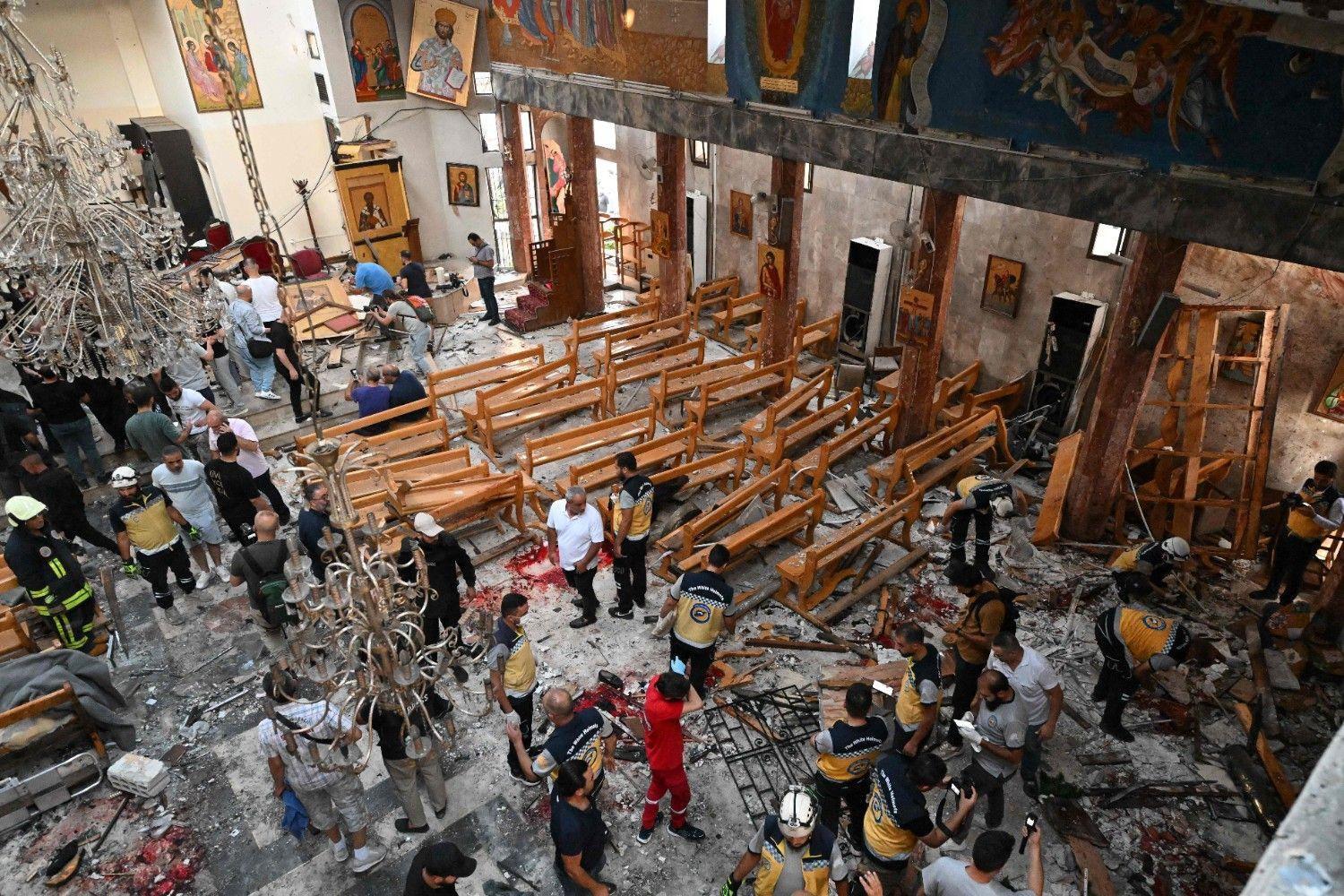
People and rescuers inspect the damage at the site of a reported suicide attack at the Saint Elias church in Damascus' Dwelaa area on June 22, 2025.
Syrian interim President Ahmed al-Sharaa vowed Monday that those involved in a suicide attack on a Damascus church a day earlier would face justice, calling for unity after the "heinous" attack.
"We promise... that we will work night and day, mobilising all our specialised security agencies, to capture all those who participated in and planned this heinous crime and to bring them to justice," Sharaa said in a statement.
The attack "reminds us of the importance of solidarity and unity of the government and the people in facing all that threatens our nation's security and stability", he added.
President Recep Tayyip Erdoğan also strongly condemned a deadly weekend attack on a Greek Orthodox church in the Syrian capital of Damascus.
He condemned the "heinous" suicide attack on the Mar Ilyas Church in an X post on June 23.
Erdoğan extended condolences to the families of those killed, the Syrian government and the people of Syria. "I wish a speedy recovery to the injured," he added.
The president said the attack was aimed at destabilizing the peace, security and coexistence in Syria and the broader region.
“In the face of this vile terrorist act targeting Syria’s peace, internal stability and culture of living together, we stand with the Syrian people and government,” he wrote.
Erdoğan underscored Ankara’s support for Syria’s efforts to combat terrorism.
"We will never allow our neighbor and brother Syria, which is, for the first time in years, looking to the future with hope, to be dragged back into instability through the hands of proxy terrorist organizations," he said.
"Türkiye will continue to support the Syrian government’s fight against terrorism."
The incident comes just weeks after Syria's Interior Ministry announced the uncovering of ISIL cells in rural Damascus on May 26. During the raid, authorities said they seized light and medium-sized weapons.
The international community condemned the attack, the first of its kind in the Syrian capital since Islamist-led forces toppled longtime ruler Bashar al-Assad in December.
It was also the first inside a church in Syria since the country's civil war erupted in 2011, according to a monitor.
The EU condemned the attack as "heinous,", saying the bloc "stands in solidarity" with Syria in combatting ethnic and religious violence.
"This heinous and cowardly violence against Christians is an attack against all Syrians," said a statement from EU foreign policy spokesperson Anouar El Anouni on the attack.
"It is a grave reminder of the need to intensify efforts against the terrorist threat and to ensure the enduring defeat of Daesh and other terrorist organizations," El Anouni said, using an alternative name for ISIL.
Security remains one of the greatest challenges for Syria's new authorities, with the international community repeatedly urging them to protect minorities.
State news agency SANA, citing the ministry of health, reported a death toll of 22, with 63 injured.
The blast sparked panic and fear in the church, which had been full of worshippers, including children and the elderly, eyewitnesses said. Families were still searching desperately for missing loved ones.
The Syrian Observatory for Human Rights said it was the first suicide attack inside a church in Syria since war erupted in 2011. Other churches had been damaged or seen attacks in their vicinity during the conflict, but none had been so directly targeted.
The Orthodox patriarchate in Damascus called on "the authorities to bear full responsibility for what has happened and is happening concerning the violation of the sanctity of churches, and to ensure the protection of all citizens".
Syria's Christian community has shrunk from around one million before the war to under 300,000 due to waves of displacement and emigration.
The United Nations special envoy for Syria Geir Pedersen expressed "outrage at this heinous crime", calling for a full investigation.
U.S. special envoy Tom Barrack said Washington supported Syria "as it fights against those who are seeking to create instability and fear in their country and the broader region".
Türkiye, which is close to the new authorities, expressed confidence that Syrians would stay united in "their fight against terrorist organisations that seek to sow
France's foreign ministry restated its commitment to "a transition in Syria that allows Syrians, whatever their religion, to live in peace and security in a free, united, pluralistic, prosperous, stable and sovereign" country.
Egypt's Al-Azhar, Sunni Islam's prestigious seat of learning, called it a "blatant assault on the right to life" and worship.
Syria's foreign ministry described the attack as "a desperate attempt to undermine national coexistence and to destabilise the country".
Assad had portrayed himself as a protector of minorities, who during Syria's nearly 14-year civil war were targeted by numerous attacks - many of them claimed by jihadist groups including ISIL.
Since the new authorities took power, the international community has urged the government to protect minorities and ensure their participation in Syria's transition, particularly after sectarian violence in recent months.
Interior Minister Anas Khattab said that specialized teams had begun investigating.
"These terrorist acts will not stop the efforts of the Syrian state in achieving civil peace," Khattab said according to a statement.
In an interview earlier this month, Khattab said that ISIL had shifted "to studied attacks on strategic targets" and had attempted "to carry out attacks against the Christian and Shiite community" that the authorities had thwarted.
Last month, ISIL claimed its first attack on Syria's new government forces. Authorities said they had arrested members of an ISIL cell near Damascus, accusing them of preparing attacks.
ISIL seized large swathes of Syrian and Iraqi territory in the early years of the civil war, declaring a cross-border "caliphate" in 2014 before being territorially defeated in 2019.